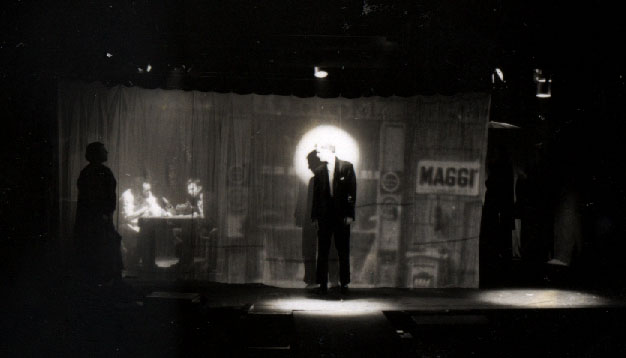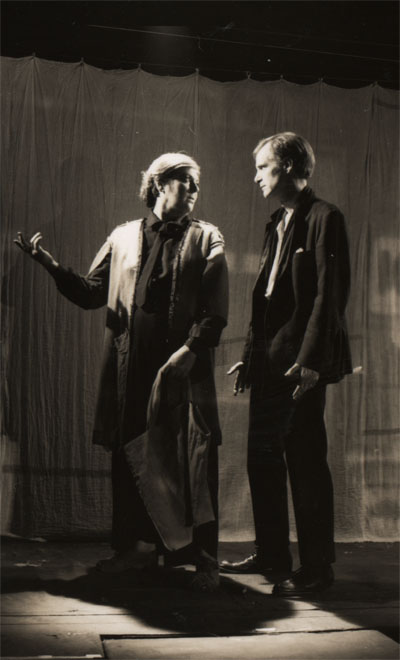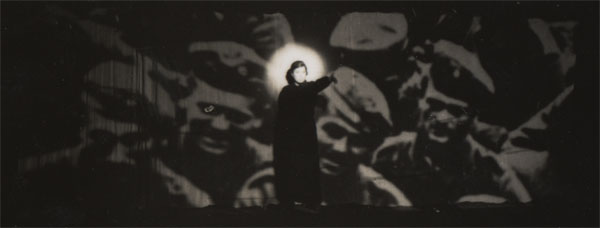
Downfall of the Egotist Johann Fatzer (American Premiere)
Encyclopedia

Downfall of the Egotist Johann Fatzer
Downfall of the Egotist Johann Fatzer is an unfinished play by Bertolt Brecht, written betyween 1926 and 1930. Der Untergang des Egoisten Johnann Fatzer, is translated as Downfall of the Egotist Johann Fatzer or Demise of the Egotist Johann Fatzer and often called the Fatzer Fragment, or simply...
took place November 9, 1978, Off Broadway at the Shelter West Theatre Company, directed by W. Stuart McDowell, then Artistic Director of the Riverside Shakespeare Company
Riverside Shakespeare Company
The Riverside Shakespeare Company of New York City was founded in 1977 as a professional theatre company on the Upper West Side of New York City, by W. Stuart McDowell and Gloria Skurski...
of New York, where McDowell subsequently staged the New York premiere of another of Brecht's early plays, Edward II. This production was inspired by the first German production of two years before, but in no way attempted to copy that production, but rather endeavored to develop a production style more appropriate to Brecht's theatre work of the 1920s.
Permission for the English translation and subsequent production was granted by Brecht's agent Bertha Case and Stefan Brecht
Stefan Brecht
Stefan Brecht was a German-born American poet, critic and scholar of theater.The son of playwright and poet Bertolt Brecht and actress Helene Weigel, Stefan Brecht was born in Berlin. He chose to stay in the United States when his family, who had arrived in Santa Monica, California in 1941,...
on behalf of the Brecht estate.
Use of music
The New York production of Fatzer starred Alexander Duncan as Fatzer, William MesnikWilliam Mesnik
William Mesnik is an American character actor, musician and playwright who appeared in numerous films and television series of the 1990s and 2000s....
as Buesching, Kaeren Peregrin as Fanny, Peter Siiteri as Koch, and Trudi Mathes as Frau Kaumann, and featured a cabaret-style score composed by Tony Award
Tony Award
The Antoinette Perry Award for Excellence in Theatre, more commonly known as a Tony Award, recognizes achievement in live Broadway theatre. The awards are presented by the American Theatre Wing and The Broadway League at an annual ceremony in New York City. The awards are given for Broadway...
-winning arranger and composer, Bruce Coughlin, played by a small jazz ensemble, and sung by leading chanteuse from Ireland and interpreter of Brecht's works, Agnes Bernelle
Agnes Bernelle
Agnes Bernelle was an actress and singer, long-based in the UK for much of her career, although she later settled in Ireland. Her family had fled Berlin in 1936...
. Miss Bernelle had earlier performed in several acclaimed productions of Brecht's work in Ireland and England, and had also recorded the popular record Bernelle on Brecht and..., produced by Philip Chevron of The Radiators and released in limited numbers by The Midnite Music Company in 1977.

The Threepenny Opera
The Threepenny Opera is a musical by German dramatist Bertolt Brecht and composer Kurt Weill, in collaboration with translator Elisabeth Hauptmann and set designer Caspar Neher. It was adapted from an 18th-century English ballad opera, John Gay's The Beggar's Opera, and offers a Marxist critique...
) which Brecht wrote with Kurt Weill
Kurt Weill
Kurt Julian Weill was a German-Jewish composer, active from the 1920s, and in his later years in the United States. He was a leading composer for the stage who was best known for his fruitful collaborations with Bertolt Brecht...
during the period of the writing of Fatzer, 1926-1928. The songs in Fatzer made comment upon the action that had transpired or was to come, as a means of both entertaining the audience and drawing a deeper lesson out of the story.
The staging
The production at the Shelter West Theatre Company incorporated several production techniques pioneered by Brecht as director, beginning with his signature "half-act curtain". This curtain was used in the production both as a projection surface, to receive titles of scenes and songs, as well as photographic images taken from historic sources from Germany of the time.At times, while songs were being sung by Agnes Bernelle, the curtain was an opaque surface, like a white chalk board, and at other times, the curtain became transparent, revealing a scene from the play behind (see photos, right). The curtain was suspended on a simple set of wires, and parted in the middle to reveal each scene.
Featured in the cast were Alexander Duncan as Fatzer, Michael Detmold, Ellen Martin, Trudi Mathes, Jim Maxson, Jay Merrik, William Mesnik, Kaeren Peregrin, Linda Jo Rauth, Rick Richardson, Peter Siiteri, and other members of the Shelter West company.


